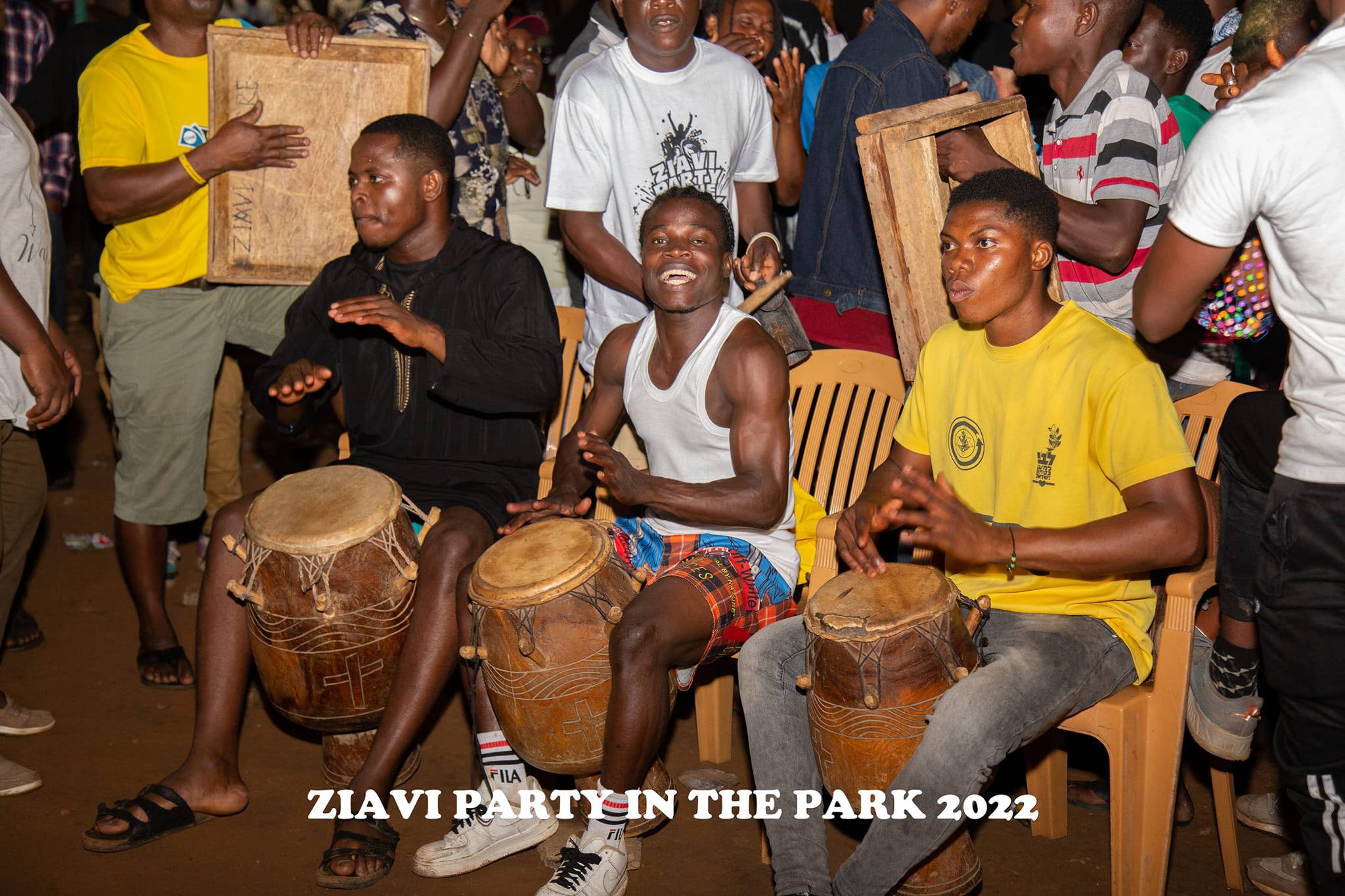I wish to talk about Zigi; the melodious music filled to the brim with legendary drumbeats, songs and dance steps without having to talk about the people of Ziavi. Well, that’s more like talking about thunder without acknowledging lightening.
Henceforth ladies and gentlemen, grab seats and relax as I drive you back through time to the very beginning of Zigi and to the originators of the popular beautiful traditional music that we enjoy today.
You may have heard the name of the small traditional area approximately 5km North East of Ho in the Volta region of Ghana. Ziavi has four (4) communities namely; Dzogbe, Lume, Adukope and Bamefedo. The people of Ziavi were farmers of coffee in very large quantities and were even at a point in time, the largest coffee farming community in the Volta Region of Ghana or perhaps, in the entire country hence the local name for coffee; Ziavi-tutui (Ziavi powder).
The Ziaviawo or Ziavi-le-amenuawo as they are affectionately or perhaps fearfully reffered to, are very popular among the Ewes (Eweawo) but getting their name stamped on coffee is not the only reason behind their popularity. What else could have made this community so popular? It is no secret that the Ewes during their migration from Nigeria to their present settlements, settled at Notsie in Togo where they later had a powerful king named Torgbui Agorkorli. During Agorkorli’s reign, the Ewes decided to migrate away from Notsie due to Agorkorli’s purported unfair style of ruling his subordinates. During their exodus from Notsie, the ewes had to break into and migrate in groups due to a number of defining factors. One such group was the Awazorli group (“walk of war” group). The Awazorli group included; the people of Kpedze-Todze, Botoku, Etordome, Kpando-Anyigbe, Mepe and Ziavi. Traces of history however prove that the people of Ando also migrated with this group. For those of us who have been to Ziavi or have heard details of their way of life, we can attest to the fact that these people hold drums in very high regard. Playing with drums when you shouldn’t, dancing to beats that you are not qualified to dance to or even playing certain sacred drumbeats are all actions the people wouldn’t dare to do. That is sacrilege and this brings us to the question; “why?”
Like the rest of the Awazorliawo, the people of Ziavi were warriors and fighters. Led by unapologetic warlords and kings, they fought many battles along the way and even at their present settlement and lost none. In order to properly protect their women and children during times of war, they settled on a very strategic stretch of land bordered on all sides by mountains and hills. During times of battle, the people defended their territory by making sure no enemy goes beyond any of their mountains into their territory. Unfortunately, the ancient Ziavi warlords were not equipped with cell phones and radios. They therefore relied on the only form of communication that was available to them at the time. Out on the mountains and even when they stage an assault, they use music to communicate with other battalions who may either be standing guard or staging well coordinated attacks on other mountains. That way, it takes their enemies longer to decode the coded messages in their drumbeats and songs. Their attacks were swift and they always had the element of surprise to their advantage. That was how they “fought many battles and lost none.”
However, a period of peace and stability soon took over from the times of war and their war drums became of little use. Drumming and dancing; an integral part of the lives of the Ziavi-le-amenuawo, became an occasional thing since the war drums could only be played for commemorative purposes. The youth, in whose veins the blood of warriors ran, began feeling bored and frustrated as farming alone was not enough to keep them from being idle. My next Article will focus mainly on the history of Ziavi but for today, let us talk about the legendary music; Zigi.
ZIGI.
Out of idleness and due to an end to the long period of war which kept the youth busy in times past, the people picked up their drums again. Yes! they did but only this time, to entertain themselves and not to fight others.
Since they could not play the beats of “Adabatram” or “Gbedzetor” or "Norliwu (Drum of Ghosts)" all of which belong to the class of warrior music, they had to invent a new kind of music. From the ancient Aviha music which could be traced back to their settlements in Nigeria, the youth created a new kind of music. The original aviha music (dirge) does not have drums and does not require drumbeats but the new musical creation of the youth of Ziavi had two (2) round drums (Asiwui) made of wood and finished with animal skin, two (2) rectangular drums (Tamalee) made of wood and finished with animal skin, a ratchet and a gakokoe (percussions). To them, this may be a step towards finally keeping themselves busy but to the world of music and music historians, this was no doubt, a giant leap. Their music had songs with very deep lyrical content that touched on religion, life, death, marriage, society, royalty, health, poverty, riches and almost every other aspect of human existence.
The music quickly became the new identity of the people of Ziavi due to it’s engaging nature.
DEVELOPING ZIGI INTO A MODERN CONTEMPORARY MUSIC.
During the period between the 1950s and the 1990s, Zigi saw a tremendous change and rebranding that made it a world class music and gave it it’s present relevance and popularity.
Mr. E.N.K. Akorli, popularly known as Paapoe; a culture, music and dance teacher, took interest in the ancient music. He with the help of others like Mr. William Darkey (a professional teacher), Miss Akosua Sakyi (a gifted singer), Mr. Dappah Kwame (drummer) and Madam Woeko Dogbey (singer) rebranded the ancient zigi music into a modern contemporary cultural music and also started the first official Zigi cultural troupe. They also had help from notable people like Mr. Gehe (Abuaka), Mr. Addo Song, Mr. Yao Ti (a gifted drummer), Mr. Yaoga and Madam Yaofe Norgbey. Notable among Paapoe’s first music students (troupe members) are; Miss Aku Golo, Miss Teresa Baffour and Miss Mawuse Akorli.
In order to eradicate the element of boredom from the dance that took it’s steps from it’s aggressive original creators, Papo and his gang of music masterminds resolved to deviate completely from the status quo. Following a period of brainstorming and meticulous planning, they finally masterminded the merger of different genres and drumbeats and consolidated them under one umbrella; Zigi. Drumbeats like “Gbolo” a genre that can be traced to the Ga people who are believed to have migrated with the Ewes, ‘Adewu” a dance of the ancient hunters, and the original “Aviha” were cleverly combined with Zigi to give it it’s contemporary sound. With this combination came the introduction of more drums, putting the total tally of drums at four (4) to six (6) round drums and two (2) rectangular drums depending on the skill of the drummers. Paapoe and his team of geniuses also composed more songs to add to the existing ones. The group rose to fame very quickly and by the 1980s, the group was arguably the best performers of cultural music from the Volta Region or perhaps Ghana. This allowed them to perform for notable and powerful individuals like the then president of Ghana, Jerry John Rawlings, Major Courage Quarshiga, Mr. Amenorwode, His Excellency John Attah Mills among others. The group performed to standing ovations and endless applause from audiences on many occasions at the Ghana National Theatre and soared higher and higher.
The success of the group prompted other people from other parts of Ghana and beyond to learn how to play and perform the same music. Today, there are a lot of Zigi troupes and other cultural troupes performing the Zigi music all over Ghana.
However, we must never fail to acknowledge and smile at the thought of the rich history behind the music. The people of Ziavi, the originators of the music still play the very best Zigi for entertainment.
ACKNOWLEDGEMENTS.
Miss Rebecca Agbale (Ofoetodoe),
Miss Ama Dzinyanu Akorli,
Miss Erica Agbale (Davi Adzo Kuma),
Mrs. Janet Kumah Akorli,
Mr. Freedom Nyagbenu,
Mr. Saviour Addo and
Mr. William Kortse.




No comments yet
Be the first to share your thoughts!